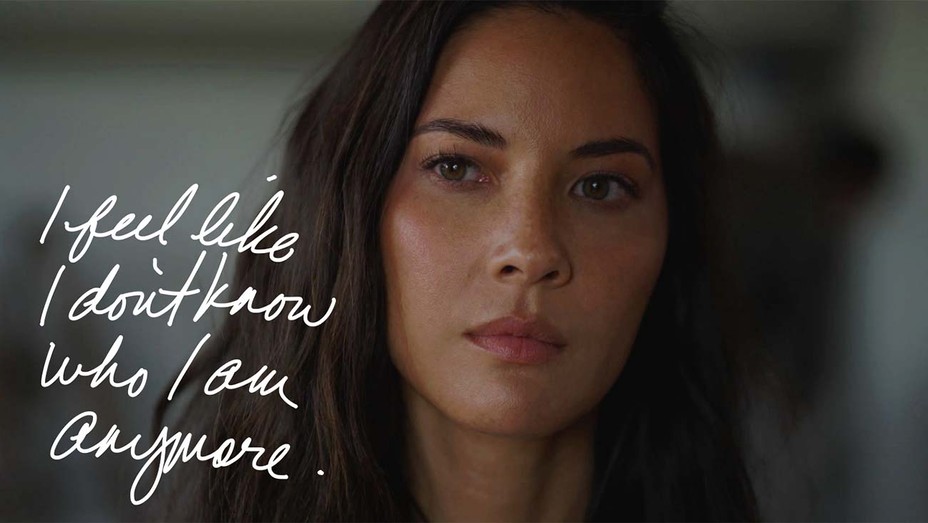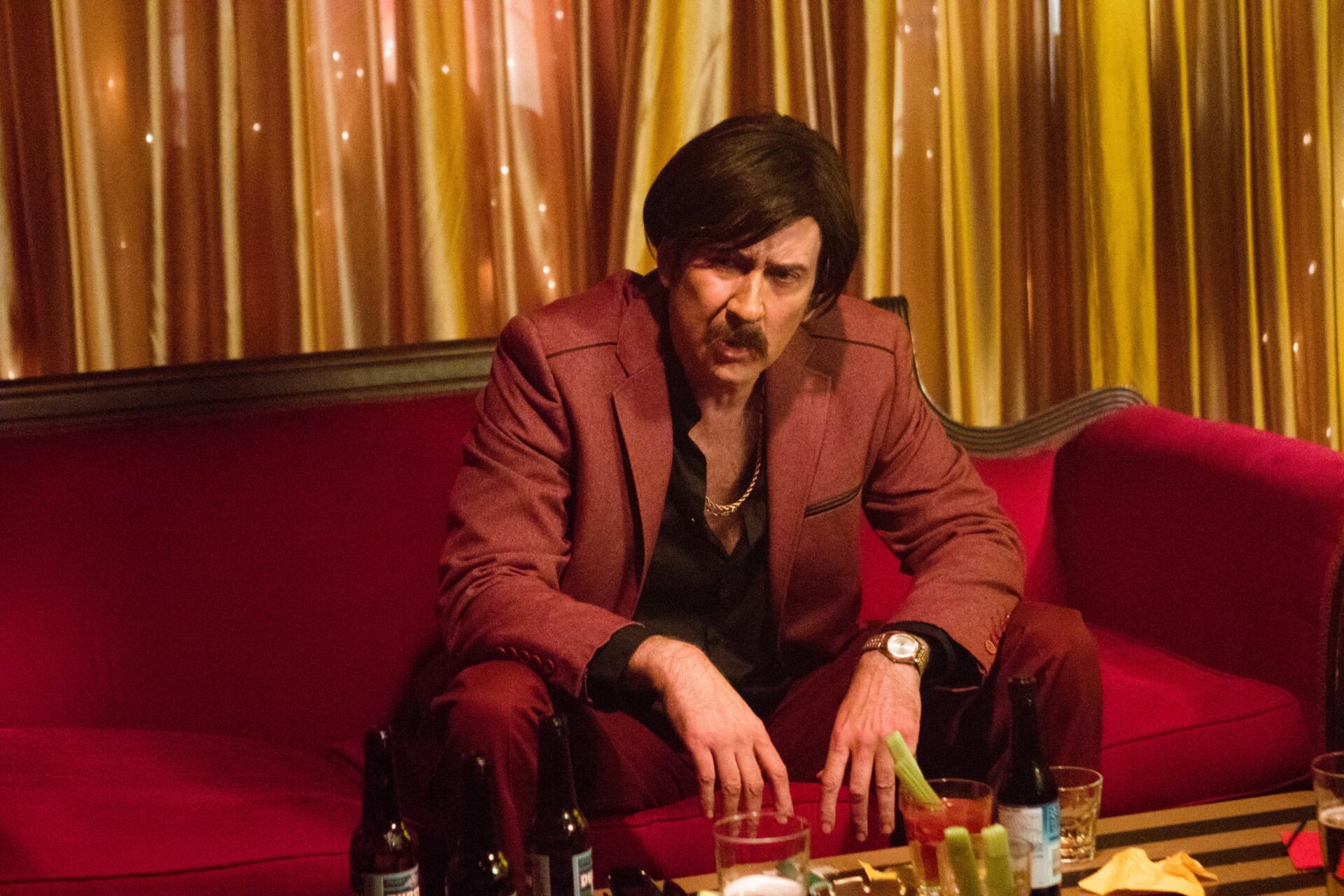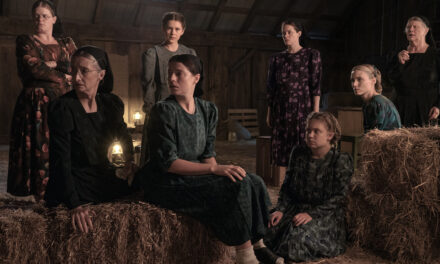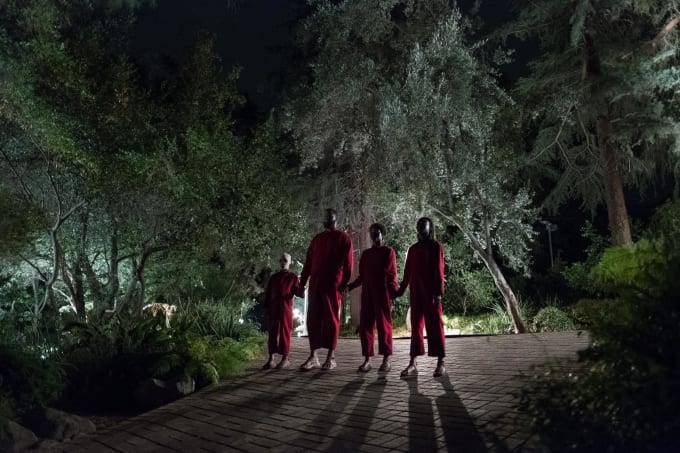There’s an old saying to always trust your gut. While intuition may be a good litmus test at points, it may get muddied up by traumatizing situations. Do you remember a time when somebody close to you may have not given you the encouragement that you need? Perhaps said something bad that stuck to you like gum on the bottom of a sneaker? Violet (Olivia Munn) appears that she has her life in order on the surface. She’s a production executive with a talent for picking great scripts. While everything could appear great on the outside, anyone with anxiety could tell you they might be screaming inside.
As you enter writer-director Justine Bateman‘s world, she takes a creative choice in showing the inner tug-o-war inside Violet. While staying at her friend Red’s (Luke Bracey) house while repairs are being done on hers, there’s a voice that beckons outside her own. She picks up a donut on the way to work, and abruptly, a male voice says “pig. The Voice (Justin Theroux) or ‘collective’ as Violet refers to it is the negative self-talk that plagues her every move. It’s abrupt, commanding, and intrusive – making her second guess everything. They range from little things to big life choices, and this trickle’s down to all aspects of Violet’s life.
She’s in a work environment where, despite her contributions, people try to walk all over her. Ranging from her slimy co-worker Bradley (Zachary Gordon) and verbally abusive and jealous boss Tom Gaines (Dennis Boutsikaris). Violet has feelings for Red, but never lets him know because The Voice constantly plagues her with made-up scenarios on how it would look status-wise. She confides in her friend, Lila (Erica Ash) about ‘the collective.’ However, when Lila brings up a pet project that Violet put her own money in, The Voice causes her to lash out. Violet has chances to either stand up for herself or say what she really wants. Electing to go with a contrarian position to her written feelings.
At first, the stylistic choice by Bateman could be jarring. It’s a lot to focus on, and it takes a couple of minutes to hone in. This is by design. Think of how you come to decisions and the amount of thoughts that try to sway you. At points, the screen completely goes red when The Voice wins. As Violet is trying to decipher decisions, quick cuts of car crashes and like imagery flashes on screen. The film takes a moment to fill the audience in on what the cause of this is. At first, the flashback scenes are minimal. Then we view Violet as a young girl and while her mother doesn’t appear physically on screen, you hear her putting Violet down. It rounds out a very volatile relationship that she has with her family (her brother Rick (Todd Stashwick) and aunt Helen (Bonnie Bedelia), in particular).
Violet is set in the hustle and bustle of Los Angeles. Parties, high-level dealmaking, and a lot of networking within the main story, Bateman is able to also interject some social commentary as well. Violet being a woman in an industry dominated by men, she has to deal with a lot of sexism and gaslighting. On top of her own long-term inner battles, she has to maneuver how to be assertive inside this world. Olivia Munn puts it all together with her performance. From the non-verbal cues of anguish that she shows when she goes against the decision she wants to make. Also, the slow rise of self-confidence that she gains when she goes against The Voice. You can see the change in Munn’s body language and tone in her voice.
By the time the film progresses into its third act, Violet takes on the metaphorical form of her written feelings. It’s a concurrent theme of skin and how you need to shed the old to get to the newer layer. Sometimes it bleeds, but feeling something like the wind against new skin is liberating. That’s not to say that The Voice completely goes away. Violet battles with it until the very end, and it will probably be a lifelong fight. But there’s a victory in recognizing that the talk inside our heads may not be our own. Whenever Violet wins, there’s a projection of a time in her pre-teens where she rode her bike carefree. As adults, we become the sum of the environments and people we’re around. Naturally, pieces of your experience will latch on to you, but you can ultimately choose what’s worth wearing.













